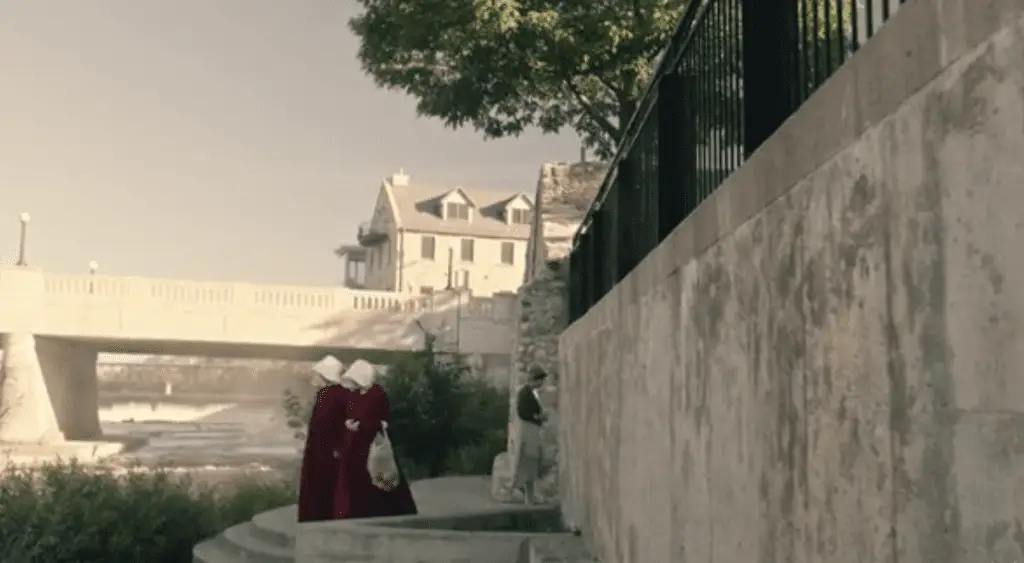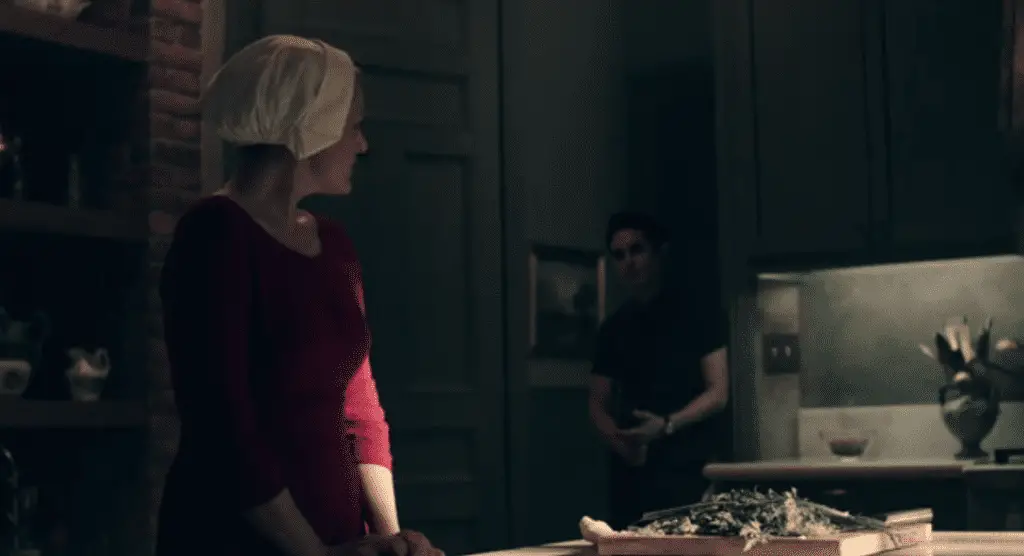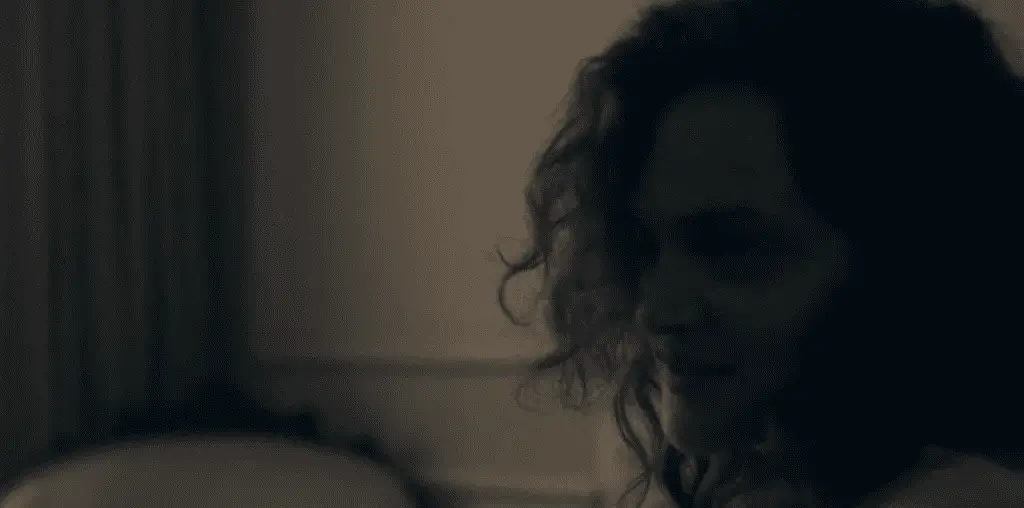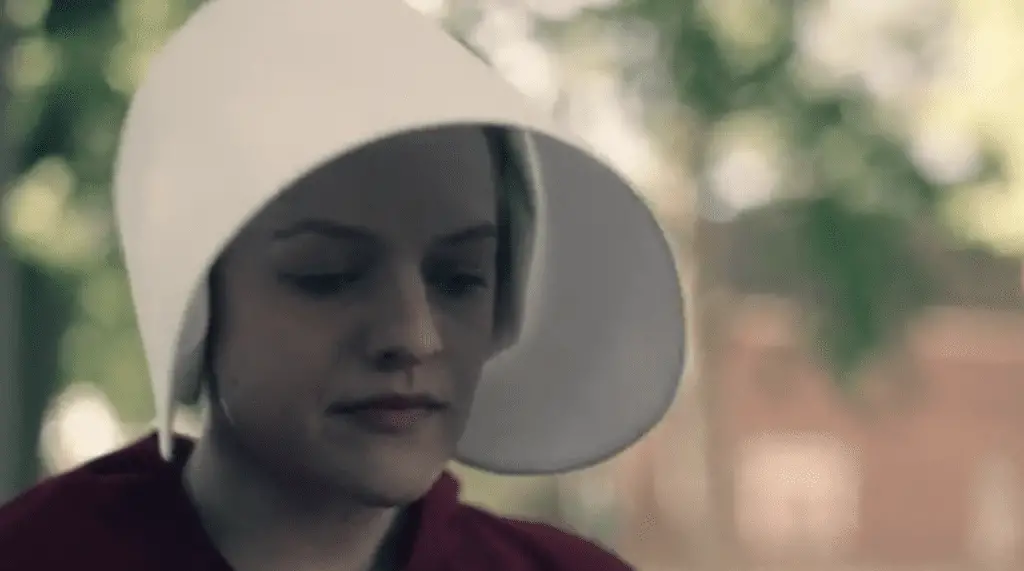The Handmaid’s Tale first three episodes became available last night. They leave us no doubt about what kind of world the story’s happening in.
Recap
We open with a couple and their child desperately trying to get away from pursuit. Their car crashes and the woman with her daughter runs. As she does, she hears shots in the distance. She is caught, and her child is taken from her.
We cut to her sitting in a room in her red dress and a white cap – the handmaid’s uniform. She remembers how she was trained, how she first came to the house she is in now. The long and short of it is that she’s forced to be a concubine to help the powerful men reproduce in a world with very low natality rates. If she gives trouble, she’ll either be executed outright or sent to the “colonies” to clean toxic waste, and die not long afterwards. One handmaid she knew had her eye plucked out for talking back.
The protagonist goes shopping with another handmaid. They always go in twos, to spy on each other. The protagonist believes her companion is a true believer in the regime.

When she comes back home, she gets ready for the “ceremony”. That is the polite way of calling her boss trying to impregnate her while she lays between his wife’s legs. Afterwards, she feels sick and runs out, where her boss’ driver watches her.
A day later, there is a Salvaging ceremony. A man convicted of raping a handmaiden is brought to their gathering. They form a mob and beat him to death. Just before, however, the protagonist finds out that the fate of her friend Moira. She was sent to the colonies and likely is dead now. The one-eyed handmaid, Janine, tells her. Janine sounds very cheerful about it. She is also very pregnant. The protagonist lets her anger about Moira out in beating the convicted man.
On their way from the Salvaging, her companion tells her she is sorry for the death of her friend. The protagonist admits she knew her from before the regime took over. They briefly discuss what it was like, before. The companion, “Ofglen” (one of the names given to handmaidens when they become handmaidens), tells her she had a wife and a son. But they both had Canadian passports, and so they escaped the regime. “Ofglen” was caught at the airport.
“Ofglen” also warns the protagonist that there is a government spy in her house, and to be careful. On another walk, she reveals herself to be a member of the reistance. She asks the protagonist to get information on her commander, since he is high-up. As soon as the protagonist enters the house, the driver warns her to be careful around “Ofglen”, because she is dangerous.

The protagonist is determined to survive, for the sake of her daughter. Her husband’s name was Luke, she remembers, her daughter’s Hannah, and her own real name is June.
This concludes the first episode.
The second one starts with the driver telling June that her boss, “The Commander”, wants to speak with her privately that night. June is terrified. She also knows this is against the rules.
A birthmobile arrives, and takes the local handmaids to Janine’s house. Her mistress is downstairs, pretending to be giving birth, surrounded by other commander’s wives. Janine is upstairs with the real deal, surrounded by handmaids.
June meets “Ofglen” in the kitchen and tells her about the meeting with the commander. “Ofglen” promises to try and find out what she can. The birth proceeds, the mistress actually sitting behind Janine during the pushing itself and pretending to push too. The child born is a healthy girl, and the mistress calls her Angela.
On the ride back home, “Ofglen” tells June that she didn’t find out anything. June, in turn, tells her about the driver’s warning.

It turns out the meeting with the Commander is about him wanting to play Scrabble with June. They’re evenly matched, but he wins. He promises June a rematch, but only after he comes back from his trip. She hesitates a moment, then asks where he’s going. Apparently, Washington.
June is laughing in relief once she gets back to her room, happy to get away with just playing scrabble. The next day, as she prepares for her walk, she’s excited to tell “Ofglen” about what she found out from the Commander. But the handmaid waiting for her turns up, and it’s someone else. “Fuck,” June thinks as the episode ends.
The third episode begins with the story June heard, about “Ofglen” being dragged away from her house by the spies in a black van.
When June returns home from the walk, she is treated to a very nice lunch by the cook of the house. Apparently, her period is a few days late and the entire female household, including the mistress, is hopeful that she might be pregnant.
She and her mistress go to visit Janine’s child. Janine’s mistress tells a story of how she was bitten by Janine when she tried to take her child from her. June goes to speak to Janine, and tries to convince her she can’t do things like that. Janine tells her she can do whatever she wants, since she gave birth to a “good baby.” She can eat ice cream now, she says. She also tells June her daughter’s “real name” is Charlotte, and that her commander loves her. She insists they are going to run away together. June seems doubtful.

She goes home ahead of her mistress, and when she tries to make small talk with the driver or subtly ask about “Ofglen”, he warns her not to be brave and to tell everything she knows. “I’m sorry,” he says, “I couldn’t stop them.” A black van is waiting for her, and a spy with “Aunt Lydia”, the woman who trained the handmaids, interrogate her. It seems “Ofglen” was imprisoned for having a relationship with one of the female servants of the house she stayed at. June admits she knew she was gay, and is punished for using such a nasty word with a taser. She then says she did not report it because “Ofglen” was her friend. She dares to quote a subversive passage from the Bible, and is being brutally tased by Aunt Lydia when her mistress comes home and stops them, claiming June is pregnant.
We see a sham trial of “Ofglen” and her girlfriend. The girlfriend is hanged, and Ofglen is taken to “redemption.”
The driver comes to apoologize to June, sort of, and they hold hands for a moment. June’s mistress dotes on her for being pregnant, but June just found out she wasn’t. When she tells her mistress, she gets thrown into her room and told to stay there and never leave.
“Ofglen” wakes up in a hospital room, and it’s heavily implied they performed something like the most brutal forms on FGM on her. We also learn her real name is Emily. The last of the released episodes concludes with Emily’s screaming face.
Review
This show certainly does a great job of depicting the most horrifying aspects of The Handmaid’s Tale universe. It’s less able, however, to cover the more subtle, insidious kind of mental conditioning behind it, without which it could never work.
To put it quite plainly, Elisabeth Moss plays June as too expressive. It might have been felt that, as they’re in a visual medium, they must have her actually act out some emotions. However, given that they also included her internal monologue (usually an anathema, but I can’t see anyone adapting this book without it), I find It rather unecessary. We do not need to see her emotions in her face if we hear them in her inner voice. On the contrary, it would have made a very good contrast that would perfectly illustrate the nature of the regime if we heard her thoughts and also saw her outwardly meek behaviour. Especially in the first episode, I kept thinking that the book!June would no doubt berate her for betraying herself so clearly so many times.

Not showing this absolutely blank face with which June goes around the world considerably lowers the effect of oppression we feel to exist in the universe. June’s inner voice is made sharper, too, much fuller of resistance. Perhaps it’s to add the contrast that is absent by her not having a complete poker face. The thing about this regime, though, is that they don’t just abuse the bodies of women, they get inside their heads and twist them to their purpose, too.
This strong mental voice, talking about grabbing a machine gun, is another way the mental violence of the regime is lessened. June is full, from the start, of little acts of rebellion. She bares her legs to the driver easily while taking off her shoes at one point. In the book, she goes on about how she is unused to seeing her own body now, or anyone else’s. Show!June seems like she is fresh in her role, while with book!June, it’s clear she’s been like that for years.
The need for faster pacing in the show, to keep the attention of the audience, additionally leads to June trusting Emily very soon. Once more, that undermines the message that everyone distrusts everyone there. We hear characters talk about it, but in their actual behaviour, there are little enough signs of it. I can tell you people in the Czechoslovakian dissent movement were more careful about who they spoke to than the people in this show are. And they didn’t have a couple new executions every day to keep them on their toes.
On the other hand, as I’ve said, this show has a real knack for depicting the horror of the most terrible scenes. The impregnation ceremony is a nightmare. The birth scene borders on extremely dark comedy. The handmaid mob execution is the only hint of the ingenuity of this regime in actually maintaining control. They allow the handmaids to let out their pent up rage and thus become complicit in the terrors of the government. And there is, of course, Emily’s story, enough to make one sick to one’s stomach.

The visuals are absolute perfection, too. The Handmaid’s Tale managed to convey the clean, ordered atmosphere of the book extremely well. It contrasts very strongly, too, with the aforementioned scenes of horror. Not just them, either: Janine is frequently a little disarrayed. She is so at the beginning, as a rebellious young woman. She is so at the end, after the birth. Janine is a disruptive factor, and it shows in the aesthetics too.
It’s difficult to say anything about the characters at this point, given how little we saw of them. The mistress was made younger, something that irritates me. Would it be less aesthetically pleasing to watch the impregnation attempts if she was old? Come on. It’s insulting, and it also doesn’t make sense. The mistress is supposed to be past childbearing age. This lady looks like she’s at peak fertility right now. Even The Commander was made younger, to go better with her, I suppose. I don’t know where this idea that no one wants to see old people on TV comes from, but I don’t like it.
Oh and, was it just me or did they mention Serena Joy on the show without explaining who she was?

